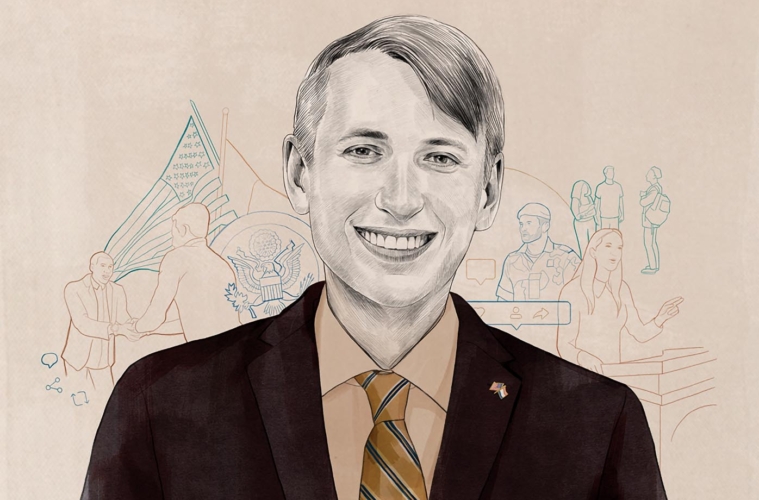Andrews began his first posting at the U.S. Embassy in The Hague.
As the United States prepared to play the Netherlands in the 2022 World Cup, foreign service officer (FSO) William Andrews ’16 and his colleagues swung into action. Andrews tweeted about the match and supported U.S. Ambassador Shefali Razdan Duggal in her friendly wager with the Dutch ambassador to the United States, André Haspels. The most popular tweet was seen nearly 400,000 times.
“Going viral might not seem like an achievement for U.S. diplomacy,” Andrews acknowledges. “But when that happens, we get thousands of new followers who will see our messaging on policy.”
The U.S. Embassy in The Hague is Andrews’ first posting as an FSO. He arrived in February 2022 — just days before Russia invaded Ukraine. He’ll be there until spring 2024, when he’ll move on to his next assignment.
Andrews’ specialty is public diplomacy, which means being one of the public faces of the United States in a host country. He handles both traditional and social media, organizes embassy outreach, and accompanies the ambassador as she tours the country. (When Razdan Duggal arrived in 2022, she committed to visiting all 12 Dutch provinces.)
He especially enjoys talking with local students and answering their questions about his home country. “I like hearing that I’ve changed their opinion on the United States and that there’s more than just the news reports and the Hollywood movies they see,” Andrews says.
Perhaps his most enduring memory came when he accompanied Razdan Duggal to a World War II commemoration and an older man asked him to serve as a translator. The man, it turned out, vividly remembered how U.S. and other Allied forces had saved his country from the Nazis, and he wanted to thank a young soldier at the event. “Translating that conversation, I almost was tearing up hearing it because it was just such a powerful moment,” he says.
Andrews, who majored in German language and literature as well as international relations, credits a Colgate study-abroad experience in Germany with inspiring him to pursue a foreign service career. Colgate’s Core Curriculum, he adds, taught him the critical thinking skills he uses every day. “Having to think about things from another perspective really prepared me,” Andrews says. “Both inside and outside the embassy, it’s really important to be able to understand where other people are coming from.”
His next assignment will be as a consular officer in another country. (Every new FSO must do consular work in one of their first two assignments.) Andrews will then return to his chosen specialty when he applies for his third assignment.
Moving every few years can be challenging for FSOs and their families, but Andrews is willing to make the sacrifice. “People-to- people exchange is what keeps the world going,” he says.
This article represents the opinions of Andrews, not the United States Department of State.

